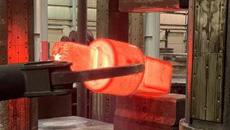A six-year project managed with NETL oversight has culminated in the manufacture of commercial-scale nickel superalloy components that are needed for higher-efficiency thermal power plants.
Launched in November 2015, the Advanced Ultra-Supercritical (AUSC) Component Testing (ComTest) Project, which was completed in late February 2022, has enabled domestic manufacturers to fabricate full commercial-scale components that will enable plants to operate with greater efficiency and at conditions of up to 1,400 degrees Fahrenheit and steam or supercritical carbon dioxide pressures of at least 3,500 pounds per square inch. At higher levels of efficiency, fossil-fueled power plants generate electricity using less fuel and produce fewer emissions.
“Through this project, Energy Industries of Ohio Inc. and other partners, with NETL support and guidance, have developed cost-effective, reliable components and brought them to the commercial-scale demonstration level of technology readiness,” said Vito Cedro III, NETL project manager.
“It is a project that positions U.S. manufacturing to produce tubing, pipe, boilers, heat exchangers and components for turbines needed to equip advanced power plants in this nation and worldwide while expanding job opportunities for American workers,” Cedro said.
The $27.7 million project, which included $20 million in U.S. Department of Energy funding, proceeded in two phases. The most recent phase focused on developing a U.S. supply chain of commercial AUSC components made of nickel-based alloys.
Nickel superalloy ingot producers, foundries, forging, pipe extrusion and bending fabricators and research centers in 15 states participated in the project to design and build AUSC components from nickel superalloys and other advanced alloys for reliable operation under both steady-state and varying-load operating conditions.
To accommodate greater amounts of wind and solar power on the electric grid, utilities must ramp down and ramp up or stop and start electricity-generating operations more frequently (a practice called cycling) to provide reliable power for their customers.
“During cycling, boiler tubes, superheaters and other vital plant components undergo large temperature and pressure stresses. The AUSC components developed through ComTest can be designed to withstand cycling for operating lifespans of least 30 years,” Cedro said.
Two nickel superalloys used in the project were approved by the American Society of Mechanical Engineers (ASME) for use in boilers and pressure vessels. The ASME Boiler and Pressure Vessel Code is regarded as one the world’s leading set of rules for the design of pressure equipment in power plants and other industrial applications.
In 2021, the new nickel-based superalloy Haynes International H282, developed by Haynes International and tested as part of the ComTest project, received ASME approval for use in boilers, fired heaters, pressure vessels and other key components.
The new superalloy is also well-suited for other high-temperature structural applications, especially those in aero and industrial gas turbine engines, because it possesses a unique combination of creep strength (the tendency of materials to deform permanently under persistent mechanical stresses), thermal stability, weldability and fabricability not found in currently available commercial alloys.
One of the final ComTest projects was a successful effort by Scot Forge to forge, machine and apply final heat treatment to a thick-wall pipe fitting manufactured with Inconel Alloy 740H, a nickel-based superalloy that offers a unique combination of high strength and creep resistance at elevated temperatures along with resistance to coal ash corrosion. Special Metals Inc., the developer of Inconel 740H, provided the ingot for the wye fitting. Inconel Alloy 740H is the other nickel superalloy approved by ASME for use in power plant boilers and pressure vessels.
NETL is a U.S. Department of Energy national laboratory that drives innovation and delivers technological solutions for an environmentally sustainable and prosperous energy future. By leveraging its world-class talent and research facilities, NETL is ensuring affordable, abundant and reliable energy that drives a robust economy and national security, while developing technologies to manage carbon across the full life cycle, enabling environmental sustainability for all Americans.




